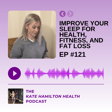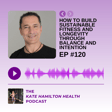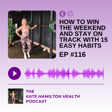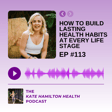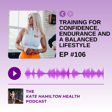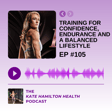
#97: Claire Dunn: Running strategies for mindset, nutrition, and success from an ultra-marathon runner
In this episode of the Kate Hamilton Health Podcast, I’m thrilled to sit down with ultra-marathon runner and experienced coach, Claire Dunn.
With over 20 years of running expertise under her belt, Claire brings a wealth of knowledge to the table, sharing practical advice for runners of all levels. From beginner-friendly tips to advanced endurance strategies, we dive into everything you need to know about running smarter, staying consistent, and finding joy in the journey.
Claire and I talk about the mindset shifts that keep runners motivated, how to overcome common challenges, and why celebrating small wins can make a huge difference. We also explore her unique approach to nutrition for long-distance runners and the importance of tailoring your training to your personal goals.
Whether you’re just starting out, looking to avoid common pitfalls, or ready to tackle your first ultra, this episode is packed with actionable advice, personal stories, and inspiration to help you take your running to the next level.
Episode Highlights
[0:00] - Welcome to the podcast!
[0:12] - Meet Claire Dunn: Running coach, ultra marathoner, and endurance expert.
[1:07] - Beginner running tips: How to get started and avoid common mistakes.
[2:06] - Managing mindset: Staying motivated and embracing challenges.
[5:12] - Overcoming beginner struggles and sticking with it.
[10:21] - Why consistency matters more than perfection.
[12:08] - Setting realistic goals for growth and progress.
[18:33] - Exploring different running styles and finding what works for you.
[24:28] - Behind the scenes of Claire’s ultra-marathon experiences.
[28:07] - Building mental resilience: Hallucinations, fears, and pushing through barriers.
[35:21] - Why strength training is essential for every runner.
[40:16] - Nutrition tips for long-distance running: Fueling for success.
[47:17] - Striking the balance between weight loss and peak performance.
[51:47] - Defining health holistically: What does it really mean?
Links & Resources:
- Connect with Claire Dunn on Instagram here
If you enjoyed this episode, please subscribe, leave a review, and share it with friends who might benefit. For more health and fitness tips, follow me on Instagram and TikTok @katehamiltonhealth.
Music b LiQWYD Free download: hypeddit.com/link/xxtopb [http://hypeddit.com/link/xxtopb] Promoted by FreeMusicPromo [https://www.youtube.com/channel/UCbycji-eySnM3WD8mbxPUSQ] / @freemusicpromo
